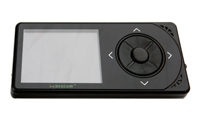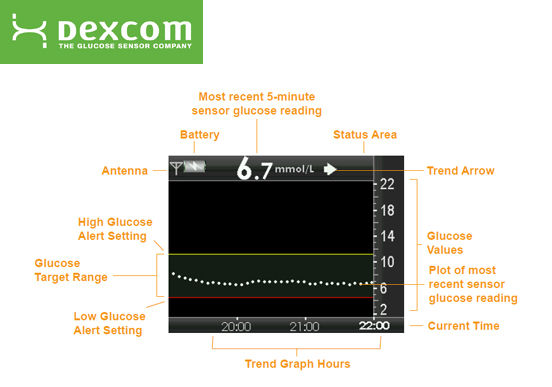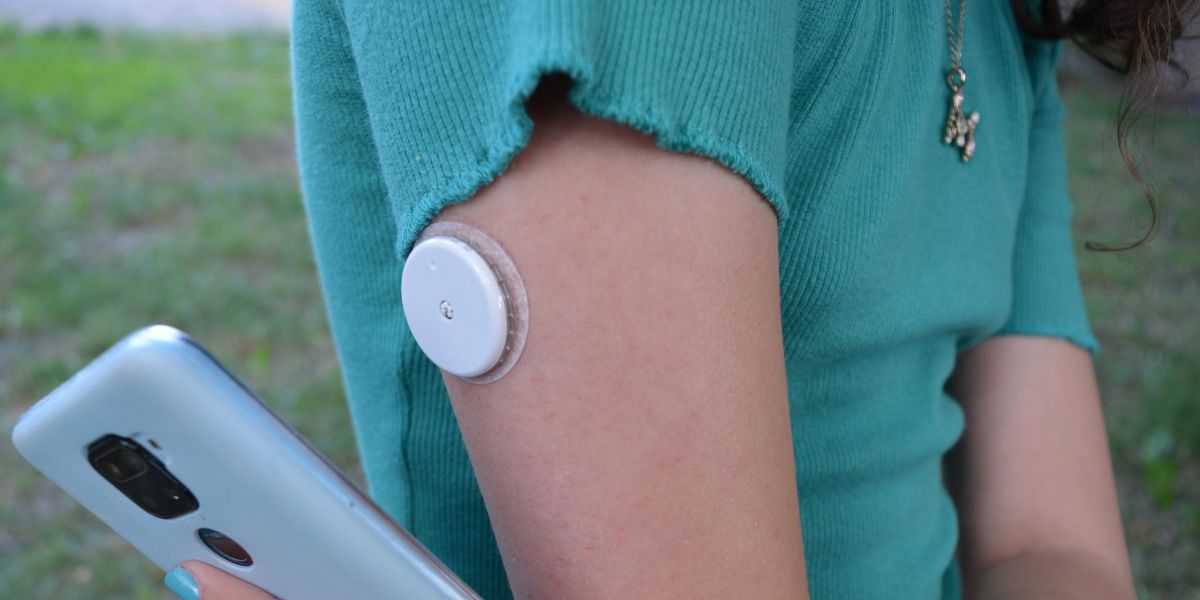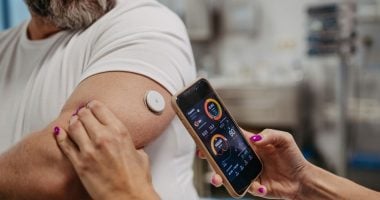
The G4 Platinum is a continuous glucose monitor (CGM) from Dexcom. Released in 2012, the G4 Platinum follows up on the success of the Seven Plus CGM
The G4 Platinum includes a small sensor which is worn on the body and tracks glucose levels at 5 minute intervals throughout the day with a strong level of accuracy.
The G4 Platinum has a range of customisable alarms to alert when glucose levels are rising or falling quickly or too high or low.
Within the UK, the Dexcom G4 Platinum may be referred to as the Dexcom G4. Whichever name is used, it is the same product.
The Dexcom G4 Platinum is available for use in adults and in children as young as 2 years old.
Features and benefits of the Dexcom G4 Platinum
- Glucose level readings provided every 5 minutes
- High level of accuracy – MARD value of 13% in adults
- Very thin sensor – the diameter of a human hair
- Receiver has a colour screen – helping to interpret results and trends at a glance
- High and low glucose level alarms
- Alerts how fast glucose levels are rising and falling
- Transmitter able to transmit readings to receiver up to 6m away
- Sensors approved for use for up to 7 days of wearing
- Directed integration with Animas Vibe insulin pump
Modern design
The G4 Platinum receiver boasts a sleek, black modern design that wouldn’t look out of place next to an MP3 player. It is noticeably thinner than the Seven Plus and is around 30% lighter.
The G4 Platinumprovides a graph of your glucose levels and does this via a colour screen. The display also includes hour markings making it clearer to read than the Seven Plus.
Increased accuracy
The G4 Platinum is even more accurate than their previous CGM the Seven Plus. The G4 Platinum is over 20% more accurate taking into account all results and 30% more accurate for results below 3.9 mmol/l.

The G4 Platinum provides a MARD value of 13% in adults and 15% in children. MARD stands for mean absolute relative difference and the lower the percentage, the greater the level of accuracy. The G4 Platinum is the first CGM to record a single digit MARD value.
As with other CGM systems, the G4 should be used as a compliment rather than a replacement for blood glucose testing The G4 will require calibrating against blood glucose levels once every 12 hours to ensure accuracy.
Integrated with Animas Vibe
If you ow, or are considering owning, the Animas Vibe insulin pump, the good news is that the Dexcom sensors can be integrated directly with the pump. This allows you to view CGM results on the pump itself.
A further advantage is that the Dexcom CGM sensors have been subsidised within the UK when used with the Animas Vibe pump. What this means is that you can get the Dexcom sensors cheaper if you have an Animas Vibe.
Alarms
The G4 Platinum features a number of helpful alarms and alerts, including:
- When glucose levels rise above a selected amount
Default setting 11.1 mmol/l but customisable and can be switched off - When glucose levels drop too low
Default setting 4.4 mmol/l but customisable and can be switched off - When glucose levels drop to 3.1 mmol/l
This feature cannot be turned off - When glucose levels are rising or falling quickly
- If the receiver is out of wireless range from the transmitter
This alert can be switched off
Alarms can be set at a number of levels, ranging from vibrate through soft sound levels to louder levels.
Larger receiver range
The transmitter sits above your skin and transmits the glucose level information to the receiver wirelessly. The transmitter can communicate with the receiver from up to 6 metres away, which is another significant improvement on the previous generation Seven Plus.
How long do the sensors and transmitter battery last for?
The sensors on the G4 can be used for up to 7 days before needing to be replaced. The G4 Platinum receiver will also indicate if a sensor needs replacing soon.
The sensors will often continue working for longer than 7 days and this is seen as an advantage for many people interested in getting a CGM as some CGM sensors cease to work after the required number of days.
Note that the sensors are only approved for use for 7 days so the additional usage you may get from using them is at your own risk so to speak.
A number of people using the Dexcom sensors have reported good levels of accuracy past the initial 7 days with those users taking care to regularly check the accuracy of the sensors against blood glucose test readings.
The transmitter battery should last for 6 months before the transmitter will need to be replaced.
Technical specifications
Sensor
- Measurement range: 2.2 – 22.2 mmol/L
- Sensor life: Up to 7 days
- Storage temperature: 2° – 25° C
- Storage humidity: 0% – 95% RH
Transmitter
- Dimensions (including sensor pod): 38 x 23 x 13 mm
- Weight (including sensor pod): 11.3g
- Power supply: Silver oxide batteries (not replaceable)
- Moisture protection: IP28: temporary submersion
- Operating temperature: 10° C – 42° C
- Operating humidity: 10% – 95% RH
- Operating altitude: -152 to 3657 meters
- Storage temperature: 0° C – 45° C
- Storage humidity: 10% – 95% RH
Receiver
- Reading frequency Every 5 minutes
- Dimensions: 101 x 46 13 mm
- Weight: 69g
- Power Supply MT21255
- Communication range: 6m
- Memory storage: 30 days of glucose data, 7 days of tech support data
- Re-chargeable battery use: 3 days
- Charging time: 3 hours wall outlet, 5 hours powered USB
- Storage/operating temperature: 0° C – 45° C
- Storage/operating humidity: 10% – 95% RH
- Operating altitude -152 to 3657 meters
- Moisture protection IP22: vertically falling drops





